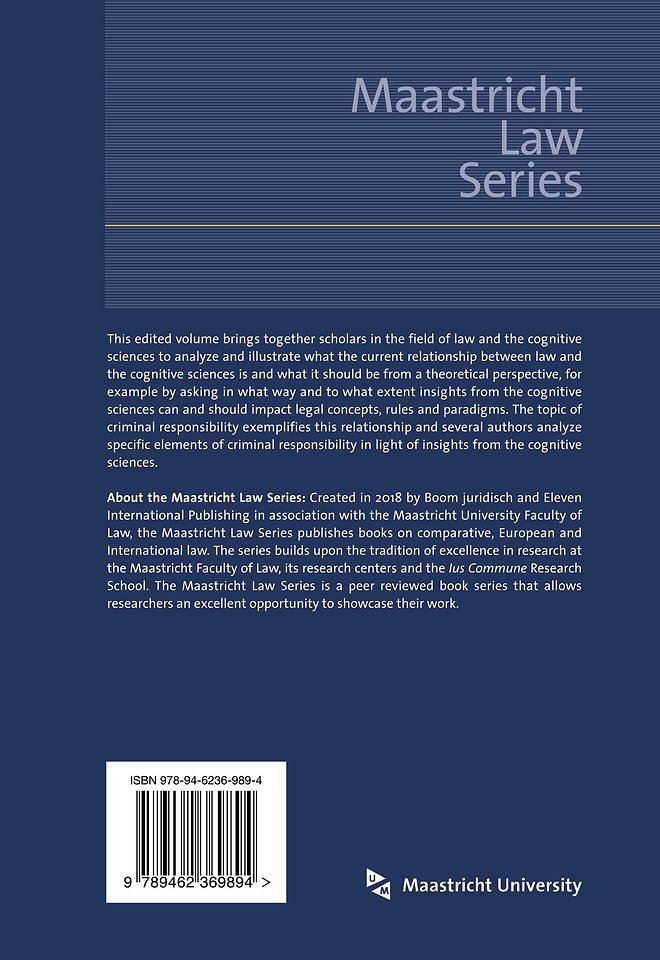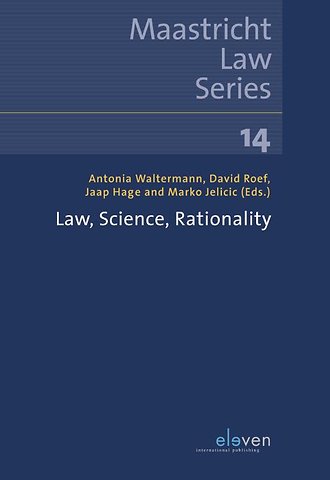



Antonia Waltermann is Assistant Professor at the Department of Foundations and methods of Law, Faculty of Law, Maastricht University.
Meer over de auteursLaw, Science, Rationality
Paperback Engels 2019 1e druk 9789462369894Samenvatting
The edited volume brings together scholars in the field of law and the cognitive sciences, in particular law and the neurosciences. It considers what the relationship between law and the cognitive sciences is and should be from a theoretical perspective, for example by asking in what way and to what extent insights from the cognitive sciences can and should impact legal concepts, rules and paradigms. The topic of criminal responsibility exemplifies this relationship and several authors analyze specific elements of criminal responsibility in light of insights from the cognitive sciences.
Trefwoorden
cognitieve wetenschappen recht rechterlijke besluitvorming psychologie vooroordelen rechtsgelijkheid rationaliteit wetenschap criminele verantwoordelijkheid strafrecht besluitvorming rechtsfilosofie rechtvaardigheid precedenten ethiek interdisciplinair onderzoek empirisch onderzoek rechtspraak sociaal contract academisch onderzoek
Trefwoorden
Specificaties
Lezersrecensies
Over David Roef
Inhoudsopgave
1 What Is Wrong with Hungry Judges? A Case Study of Legal Implications of Cognitive Science 1
C. Bublitz
1 Introduction 1
2 The Hungry Judge Study 2
3 Legal Errors 6
3.1 Correct and Incorrect Decisions 6
3.2 Context of Discovery and Context of Justification 9
3.3 Extralegal Factors? 10
3.4 Procedures & Biases 12
3.5 What Then Is the Problem? 15
4 Normative Implications 16
4.1 Treating Like Cases Alike 16
4.2 Precedent and Stare Decisis 16
4.3 Criticism of Equal Treatment 17
4.4 Social Contract & Equal Treatment 18
4.5 Limits to Equal Treatment: Disagreement and Diversity 19
5 Assessing the Study 22
6 Conclusion 24
References 26
2 Autonomy, Reason and Bias in Contract Law 31
J. Hage
1 Introduction 31
2 The Justification of Contractual Obligations 33
2.1 Reliance on Specific Promises 34
2.2 Autonomy, Will and Intention 35
2.3 Preferences and Interests 37
2.4 If Preferences and Interests Do not Match 38
2.5 Conclusion on the Justification of Contractual Obligations 41
3 The Anchoring Bias 43
4 Coping with Irrationality 45
5 Conclusion 46
References 48
3 Why Non-Human Agency 51
A. Waltermann
1 Introduction 51
2 Non-Human Actors and the Law 52
2.1 Corporations 53
2.2 States 56
2.3 Animals 58
3 The Metaphysical Frame of Reference of Action 61
4 Investigating the Metaphysical Frame of Reference 65
5 The Relevance of Investigating the Metaphysical Frame of Reference 67
6 Conclusion 68
References 70
4 Bringing (theRight) FeelingsBack:Culpability, Punishment, and Violence in the Era of Social and Affective Neuroscience 73
F. Coppola
1 Introduction 73
2 Culpable Agency and the Narrative of the Typical Violent Perpetrator 77
3 Emotions and theCriminal Law’sConstruct of ViolencewithinCulpability and Punishment 79
4 Emotions, Socio-environmental Factors and (Pro)social behavior 81
5 Emotions, the Social Environment, and Violence 86
6 Neuroscientific Research in (Forensic) Clinical Populations 89
7 Implications for Criminal Law 94
7.1 Culpability 94
7.2 Punishment 98
8 Conclusion 100
References 102
5 The Relevance of Free Will, Rationality, and Aristotle for Legal Insanity 113
G. Meynen
1 Introduction 113
2 Lack of Free Will as the Justification of Legal Insanity 114
2.1 Free Will and Debates Surrounding It 114
2.2 Free Will and Standards of Legal Insanity 119
3 Lack of Rationality as the Justification of Legal Insanity 123
4 Aristotle’s Model and Its Legal Application 127
4.1 The Aristotelean Components of Responsibility 127
4.2 The EpistemicComponent Should Be Interpreted in the Moral Sense 129
4.3 The Control Prong Should Be Included 131
5 Conclusion 132
References 134
6 Coercive Forensic Neuroimaging and the Prohibition of Ill-Treatment (Article 3 ECHR) 141
S. Ligthart
1 Introduction 141
2 Forensic Neuroimaging 143
3 Coercion: Two Types and Their (Legal) Relevance 145
4 Article 3 ECHR and Coercive Forensic Neuroimaging 147
5 Coercive Forensic Neuroimaging in Light of Article 3 ECHR 149
5.1 Introduction 149
5.2 An Analogy 150
5.3 Compulsory Medical Procedures to Obtain Evidence and Article 3 ECHR 152
5.4 Coercive Forensic Neuroimaging and Article 3 ECHR 156
6 Conclusion 166
References 169
7 Personality Change, Criminal Responsibility and Diminished Capacity 177
P. Catley
1 Free Will and Responsibility 177
2 Personality Change: The Classic Case 179
3 Personality Change: A Modern Classic 180
4 Linking Brain Injuries with Criminality 182
5 Personality Change and Responsibility: Two Contrasting Cases 183
6 Three More English Cases 187
7 Interim Conclusions from the English Cases 191
8 Inadequacy of English Law 192
8.1 Automatism 193
8.2 Insanity 194
8.3 Other Defences 195
9 Towards a Better Approach 196
9.1 Is the Medical Condition Linked to the Behaviour? 196
9.2 Was the Medical Condition an Operative Factor at the Time of the Act? 196
9.3 What Part Did Other Factors Play? 197
9.4 Lack of Control 198
9.5 A Possible Reform 198
9.6 Diminished Responsibility 199
9.7 A Better Option: A General Diminished Capacity Defence 200
9.8 Comparison with Morse’s Proposed Defence 202
10 Conclusion 204
References 206
8 Addiction, Capacities and Criminal Responsibility – A Comparative Analysis 209
A. Goldberg & D. Roef
1 Introduction 209
2 A Capacitarian Approach to Addiction 211
3 The Insanity Defence Compared: Evaluating a Legal Framework for Addiction 216
3.1 Degrees of Criminal Responsibility 216
3.2 The Common Law (England and Wales) Approach 218
3.3 The German Approach 222
3.4 The Dutch Approach 225
4 Conclusion 229
References 232
9 Coercion Changes Sense of Agency? 237
L. Claydon
1 Introduction 237
2 What MayCognitive Neuroscience Tell UsAbout OurIndividual Sense of Agency? 238
3 An Experimental Paradigm Designed to Test the Experience of Following Orders 240
4 Practical Problems for the Law 242
5 Difficult Cases that Formed the Law 244
6 Problems with the Defence 245
7 Law, Traditional Jurisprudence, and Folk Psychology 247
8 Does the Law Need Assistance from Experts? 249
9 New Approaches to Coercion and Control 252
10 Two Different Approaches to Coercion and Control in English Law 254
11 The Circumstances of R v A 256
12 Conclusion 258
References 262
10 Criminal Law for Young Adults in the Netherlands: The Law and the Practice from the Sociology of Childhood Perspective 265
M. Hopman & D. de Vocht
1 Introduction 265
2 Methodology 268
3 Criminal Law for Young Adults: The Legal Framework 269
4 Criminal Law for Young Adults: The Practice 275
5 Comparing the Law, Guidelines and Court Practice 285
6 Taking a Different View: The Critical Perspective of Sociology of Childhood 287
7 Conclusion 289
References 291
Affiliation of Contributors 293
Anderen die dit boek kochten, kochten ook
Rubrieken
- advisering
- algemeen management
- coaching en trainen
- communicatie en media
- economie
- financieel management
- inkoop en logistiek
- internet en social media
- it-management / ict
- juridisch
- leiderschap
- marketing
- mens en maatschappij
- non-profit
- ondernemen
- organisatiekunde
- personal finance
- personeelsmanagement
- persoonlijke effectiviteit
- projectmanagement
- psychologie
- reclame en verkoop
- strategisch management
- verandermanagement
- werk en loopbaan





